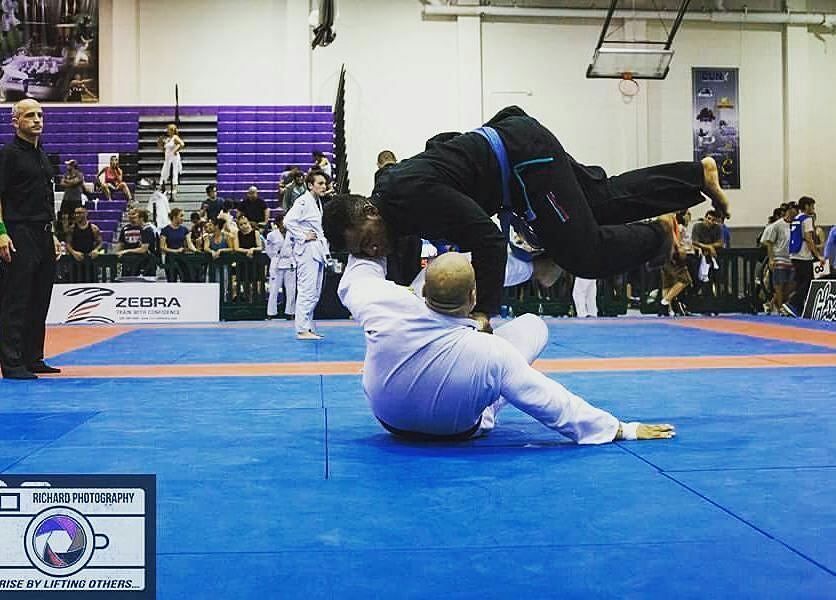
Ultra Heavyweight Tafon flies over his opponent in the absolute division of the IBJJF New York Summer Open 2016
Regardless of how you feel about competition, competing is essential to Brazilian Jiu Jitsu development. At Crazy 88, we’ve noticed that the BJJ students that progress most quickly are those that are competing.
Training Jiu Jitsu seeks to develop a skill set. For example, it is not the same as reading about the science of the body, which may be intrinsically interesting but it is not a skill set, it is knowledge learned. Practicing medicine is the skill set. If your doctor didn’t pass the required tests in school and study the application of medicine under a trained practitioner for years, you wouldn’t take advice from the doctor again.
In Brazilian Jiu Jitsu, you may watch videos and be able to identify a kimura and an arm bar. That is the knowledge learned. But performing a kimura or an arm bar against a resisting opponent is a very different thing. In training, you learn the application of many skill sets in Jiu Jitsu. As with medicine, tests are a prerequisite to demonstrate that knowledge has been acquired and turned into a skill set that can be properly used. Education has tests, which is a timed environment that puts pressure to perform at a high level within a set of parameters. Once you pass the test, you go off into the real world and apply it to your job. That application at a job is the skill set.
Competition provides the added stress needed to test said skills that a training room does not. It also requires that you know the material and can then apply it to an uncertain and changing environment. If you can’t perform under stress, there could be an argument that student should not to be promoted to the next belt level. Performing under stress is a mental skill that needs to be developed, just as the mechanics of a sweep or a pass.
I will distinguish here that there is a difference between competition results and performance in competition. A quick submission artist might win a lot of matches, but fail to know the fundamentals. People are often fooled by the flashy submissions. A student with solid fundamentals might show continual improvement in competition, but not win every tournament. Since the outcome of matches cannot not always be predicted, that same student might merit a belt promotion over the submission artist.
The quick submission artist is the student who at the lower belts can win with flying triangles and jumping guillotines. If the quick submission artist is promoted too fast, they will eventually run into opponents that can defend against the quick submission with better fundamentals. Eventually there is a leveling out effect and the submission artist’s true ability will show through.
Competition is a requirement for skill development as it is a mixture of athletic ability (the car) and the skill (the driving ability) underneath the umbrella of mental skills. What limits your ability to drive a car around a rocky mountain pass at 160 mph? All three aspects.
Competition can hide the skill of the driver because of too much or too little athletic ability and too much or too little mental skills. Training in the room hides the mental focus almost completely. When all three aspects come together correctly and in balance, truly great athletic achievements can be reached. As in the Olympics, some athletes set new world records and have almost flawless performances, which doesn’t happen in every day training. It is a product of peak athletic ability, skill set, and mental skills working together. When this happens, athletes are changed. Competitors make huge level jumps and improve faster as a result of competing. Competition is thus a skill set inseparable from Jiu Jitsu and must be practiced over time.